by admin | Apr 19, 2017 | Message from Kahu
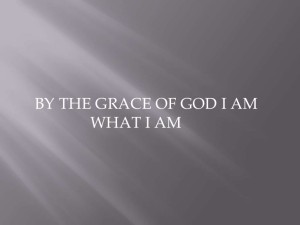
By the Grace of God, I Am What I Am
1 Corinthians 15:10
Easter Sunday was a very special day in the life of Koloa Union Church! During our worship service, we baptized five children and two adults, and we welcomed 6 new members! The service was filled with hopeful and beautiful music.
My message focused on the Apostle Paul’s message to the Corinthians: how the risen Christ appeared to so many people at different times and in different ways. Paul says that Christ even appeared to him—not that he deserved it. And then Paul says, “But by the grace of God, I am what I am.” I shared that this is the idea is the point of our baptisms: I am what I am, you are what you are, we are what we are, by the grace of God. As you read Paul’s First Letter to the Corinthians, it is apparent that God’s love flows into our lives and fills us up, so much so that this love spills over into the lives of others; for we are all God’s beloved children.
I shared the story of Louie Zamperini, the American Olympian who survived 47 days in an inflatable raft on the open ocean and then two years in a POW camp during World War II. He left for the war as a national hero, but came home feeling broken and ashamed. His depression, PTSD and inability to sleep drove hime to drinking, and his life was quickly spiraling downward. Yet, he remembered a promise he made to God while he was floating at sea: “If you save me, I will serve you forever.” He found his old Bible and started attending church services, and he too encountered the risen Christ. He no longer saw himself as a national hero or a broken person who barely made it home from the war alive. Rather, he was a beloved child of God; and God’s love for him was so immense he found himself sharing it with others. He too came to realize what the Apostle Paul realized: “By the grace of God, I am what I am.”
May you also realize that those same words are for your life as well. I invite you to say them over and over—and then just see what God might do with your life.
Aloha nui!
Kahu Alan Akana
____________
Click HERE to see a video of Sunday’s sermon. Videos of Kahu’s sermons are available most weeks. Please share these videos with friends and invite them to church. You can also subscribe on YouTube anytime you watch a sermon; that way you can easily watch any past sermon and even receive a notification when a new sermon is posted.
“A Message from Kahu Alan Akana” is provided most weeks by the Kahu (Pastor) of Koloa Union Church, a congregation of the United Church of Christ (UCC), a member of the Kauai Association and Hawaii Conference.
by admin | Apr 11, 2017 | Message from Kahu

BLESSED ARE THE PEACEMAKERS
FOR THEY WILL BE CALLED CHILDREN OF GOD
MATTHEW 5:9
During our worship service on Sunday, the children of the church performed their Easter play for us called, “It wouldn’t be Easter without….” They talked about all of the things that children like about Easter: the Easter bunny, Easter baskets, candy, eggs and, of course, peeps! Yet the children reminded us that it wouldn’t be Easter without Jesus, and it wouldn’t be the same without everyone! It was a beautiful and meaningful play, as the children mentioned Palm Sunday, Easter, resurrection, Jesus and the importance of everyone feeling welcome.
I then shared briefly about Jesus’ message of peace as he entered Jerusalem on a donkey and as the crowd spread their branches on the ground before him and shouted “Hosanna!” His peace was very different from Pax Romana—the peace of the Roman Empire. The Romans used exploitation, oppression and intimidation to get what they wanted, and they called it “peace.”
Jesus taught an altogether different way of understanding peace. To him, peace meant life, love, and service to one another. As followers of Jesus, we too understand peace in this way. I invited everyone to look around and discover the places where peace is missing—and bring peace to those places: life, love and service to one another.
I invite you now to look around this week and do just that; I also invite you to join us on Maundy Thursday as we commemorate Jesus’ last supper with his disciples…to our Easter sunrise service at Kukuiolono Park… and our Easter worship service at the church. May this Holy Week and Easter be filled with hope as we remember that life and peace are always possible—even when it seems like it’s the last thing that can happen.
Aloha nui!
Kahu Alan Akana
“A Message from Kahu Alan Akana” is provided most weeks by the Kahu (Pastor) of Koloa Union Church, a congregation of the United Church of Christ (UCC), a member of the Kauai Association and Hawaii Conference.
by admin | Apr 6, 2017 | Message from Kahu
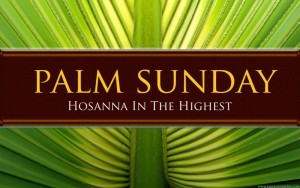
JOIN US THIS WEEK FOR PALM SUNDAY!
___________________________
BLESSED ARE THE PURE IN HEART FOR THEY WILL SEE GOD
MATTHEW 5:8
On Sunday, I shared with the congregation some of the writings of Soren Kierkegaard, the 19th century Danish philosopher. One of my favorite essays of Kierkegaard is called Purity of Heat. In it, he says “Purity of heart is to will one thing.” Kierkegaard argued that a person could not be pure in heart if he or she pursued many different things in life. On the other hand, if a person only willed one thing, that person would be pure in heart. According to Kierkegaard, the only way to pursue one thing was to pursue God; and Kierkegaard attempted to pursue God with his whole being.
In our Gospel reading on Sunday, we read from Matthew: “Blessed are the pure in heart, for they will see God.” I believe Kierkegaard understood these words of Jesus better than anyone else I have read. If we pursue God above all else, we will see God more clearly.
On Sunday, we celebrate Palm Sunday and begin Holy Week. I invite you to join us and invite friends and family members to church during this very special time of year. On Palm Sunday, we will remember Jesus’ triumphal entry into Jerusalem on a donkey. On Maundy Thursday, we will commemorate Jesus’ last supper with his disciples. On Friday, our children will gather to decorate Easter eggs. And, of course, on Easter Sunday, we will celebrate the resurrection of Jesus.
I look forward to spending Holy Week with the people of Koloa Union Church!
Aloha nui!
Kahu Alan Akana
Click HERE to see a video of Sunday’s sermon. Videos of Kahu’s sermons are available most weeks. Please share these videos with friends and invite them to church. You can also subscribe on YouTube anytime you watch a sermon; that way you can easily watch any past sermon and even receive a notification when a new sermon is posted.
“A Message from Kahu Alan Akana” is provided most weeks by the Kahu (Pastor) of Koloa Union Church, a congregation of the United Church of Christ (UCC), a member of the Kauai Association and Hawaii Conference.
by admin | Mar 29, 2017 | Message from Kahu
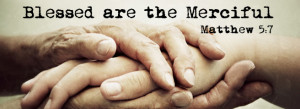
BLESSED ARE THE MERCIFUL FOR THEY WILL RECEIVE MERCY
MATTHEW 5:7; JOHN 9:1-39
On Sunday, we read the story of Jesus healing the blind man in the Gospel of John. His disciples asked Jesus, “Who sinned, this man or his parents, that he was born blind?” They assumed, as many of us do at times, that someone is to blame for the painful and challenging things that happen to people, and we often blame ourselves. Most of us have said at least once in our lives, “What did I do to deserve this?”
Well, Jesus responded to the disciples, “He was born blind so that God’s work might be revealed in him.” The Greek word for “work” can also be translated “handiwork” or “workmanship.” The verse can be translated in this way:
“He was born blind so that God’s handiwork might be revealed in him.”
I think the point is that the man was born so that God would do things in and through the man’s life. I also wonder if Jesus may have been alluding to the belief that the man himself was God’s handiwork. I think it is important for us to remind ourselves that we were born so that God would do things in and through our lives, and we too are God’s handiwork.
Even though God was already working in the man’s life—even while he was blind—Jesus showed mercy to the man by giving him his sight. I find it interesting that the passage started out with the disciples assuming sin was involved in the man’s predicament, and then, after the Pharisees questioned the man about his vision, they called Jesus a sinner and told the man that he was “born entirely in sin.”
We have a choice in how we see ourselves and others. On the one hand, we can see as Jesus saw people: that we are born so that God’s handiwork might be seen in and through our lives. On the other hand, we can see as the Pharisees saw the people with whom they disagreed politically and theologically: that we are born in sin, that people have challenging circumstances because of sin, and that people disagree with us because of sin. When we see through the eyes of Jesus and allow people to be who they are, we look for God’s handiwork in and through them, and show mercy to them.
Aloha nui!
Kahu Alan Akana
____________
Click HERE to see a video of Sunday’s sermon. Videos of Kahu’s sermons are available most weeks. Please share these videos with friends and invite them to church. You can also subscribe on YouTube anytime you watch a sermon; that way you can easily watch any past sermon and even receive a notification when a new sermon is posted.
“A Message from Kahu Alan Akana” is provided most weeks by the Kahu (Pastor) of Koloa Union Church, a congregation of the United Church of Christ (UCC), a member of the Kauai Association and Hawaii Conference.
by admin | Mar 22, 2017 | Message from Kahu
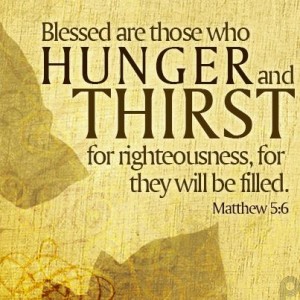
On Sunday, I shared in my sermon the story of Maria. She was a young woman running a soup kitchen for children in her village in El Salvador. According to her government, she was helping people who should be helping themselves, so they labeled her a communist and placed her on its notorious “hit list.” When friends warned her that she would be shot in the very near future, she left her village in the dark of night. For weeks on end, she traveled at night and hid during the day as she traveled north. After nearly 3,000 miles, she arrived at the U.S. border and applied for legal entrance via the 1980 Refugee Act, which guarantees admission to refugees who have a “well-founded fear of persecution” because of their religious or political convictions. Like 97% of the people in her shoes, Maria was denied admission into the United States. She knew if she returned to El Salvador, she would be killed the minute she arrived, so she entered the U.S. as an illegal immigrant. Fortunately, there were churches here who helped her.
I also shared the story of Ahmed. He fled his country of Syria with his family because he knew they would likely all be shot if they remained. He led his eight family members out of Syria to Libya where they were told they could catch a boat to Malta. When they arrived in Libya, they were locked in a stable on a farm for weeks, while their guides waited for more refugees to arrive. Eventually, the guides told Ahmed that there were enough refugees to make it “worth their while,” but it would cost an extra $3,000 per person for rent and food for their “unexpected” stay. Even though that money was about all his family had left, they forked over their life savings and climbed aboard a boat that was hardly seaworthy. While drifting toward Malta, the refugees realized that their guides were following them. They soon opened fire on the refugees, killing most of them and causing their boat to sink. Miraculously, Ahmed lived through the ordeal and made it to Malta. All of his family members died at sea. Fortunately, there were people in Malta who helped him.
Today’s refugees are certainly among those who hunger and thirst for righteousness, for justice, for making things right. Jesus said that they are blessed and that their hunger and thirst would be filled. He also said that when we feed the hungry, give water to those who are thirsty, and welcome the stranger, we are doing those things for Jesus himself. I can only wonder if Jesus was thinking of his early years as a refugee with Mary and Joseph when they fled the Middle East and traveled to North Africa as strangers.
There are millions of refugees in the world who hunger and thirst for righteousness—some 5 million from Syria alone. The numbers are so big, I often have a feeling like there is very little I can do to make a difference. I suggested that there are four things that we can do:
- We can learn about refugees and listen to their stories. The U.N. Refugee Agency website always has stories about the experiences of refugees and what they have been through before, during and after fleeing their countries. Seeing the world through their perspectives has helped me to want to do something to help.
- We can pray for refugees. Once we have a name and a face, it is easier to pray for someone’s wellbeing. It is also easier to pray about our own involvement in being part of the solution.
- We can talk about possibilities and options regarding engagement and action. On Wednesday nights during Lent our congregation meets to talk about the Scripture, theme and sermon of the previous Sunday. Please join us this week if you want to be part of the conversation about refugees.
- We can give generously to the United Church of Christ’s annual offering called One Great Hour of Sharing. Every year, UCC congregations give millions of dollars to help refugees, people displaced by natural disasters, the homeless and hungry. Please consider a generous gift this year on Palm Sunday, Maundy Thursday and/or Easter Sunday.
Whatever it is you decide to do, remember the words of Jesus from Matthew’s Gospel, chapter 25: “Just as you did it to one of the least of these who are members of my family, you did it to me.” May we show compassion to all, just as Jesus did.
Aloha nui!
Kahu Alan Akana
______________
Click HERE to see a video of Sunday’s sermon. Videos of Kahu’s sermons are available most weeks. Please share these videos with friends and invite them to church. You can also subscribe on YouTube anytime you watch a sermon; that way you can easily watch any past sermon and even receive a notification when a new sermon is posted.
by admin | Mar 13, 2017 | Message from Kahu
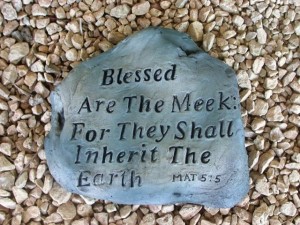
BLESSED ARE THE MEEK
As we continue our Lenten journey this year, we pause each week and consider one of Jesus’ beatitudes (Jesus’ blessings in the Gospel of Matthew, chapter 5). This week’s beatitude is:
Blessed are the meek for they will inherit the Earth.
On Sunday, we met at the beach as we considered how meekness is an attitude and way of being in the world. I mentioned in my sermon that it would be difficult to be proud and think that I am the center of the universe as I looked at the ocean in front of me on that clear day. It is immense and I am humbled to stand at the ocean and consider how vast and deep it is.
We also read from the third chapter of John’s Gospel, where Jesus told Nicodemus: “No one can see the Kingdom of God without being born from above (which can also be translated “born anew” or “born again”).” There is a certain humility we must have in order to start over, or admit that we don’t have our act together all the time, or begin seeing the world around us in a whole new way. Yet, this is what Jesus called people to do if they want to truly see the realm of God among us.
Our attitude makes a huge difference in how we see the world and how we create community and a world where God’s love is felt by everyone. I encourage us all to be open to new ways of being in the world, especially being humble so that we can see and learn new things.
I invite you to join us on Wednesday evening at 6 o’clock as we enjoy a soup supper and consider these things in reflection, conversation and prayer.
Aloha nui!
Kahu Alan Akana
_______________
Since we were at the beach on Sunday, there is no video of this week’s sermon.
“A Message from Kahu Alan Akana” is provided most weeks by the Kahu (Pastor) of Koloa Union Church, a congregation of the United Church of Christ (UCC), a member of the Kauai Association and Hawaii Conference.








Recent Comments